What We're Fundraising For
La Tiendita Student Pantry
Since 2017, La Tiendita has been addressing food insecurity among our students by proving non-perishable food items, toiletries, household cleaning products, and more. Our donation-based pantry is completely anonymous and is located on the second floor of the Gordon-White Building.
With the rising cost of living in the Austin area, we have seen an exponential increased usage of La Tiendita. Our resources are limited and quickly depleting. This year we are asking for your help to keep La Tiendita stocked for many semester to come!
We thank you for your support.

40 for Forty
40 hours of fundraising can go a long way if your friends support you! On April 10th and 11th UT Austin launches its annual giving campaign 40 Hours for the Forty Acres, and Latino Studies is raising money for our free student pantry La Tiendita and Latino Studies as a whole. Make a donation or sign up to be a Latino Studies Ambassador and reach out to your network to find donors who are willing and able to give. There are all sorts of goodies and incentives to Ambassadors who help to get the word out! Thank you!
Become an Ambassador
Make A Donation

Photo Credit.

LATINO STUDIES
Department of Mexican American and Latina/o StudiesCenter for Mexican American StudiesLatino Research InstituteEvents + NewsGivingLink 6Photo Credit.
The mals 10TH ANNIVERSARY MURAL IS COMPLETE!
There's a brand new vibe in the Latino Studies office space and it comes with the completion of the MALS 10th Anniversary community mural! We've spent the 2024-25 academic year commemorating a decade of emboldened scholarship in the Department of Mexican American & Latina/o Studies (MALS) and the mural represents our purpose and permanence on UT campus. Artists-in-Residence Cindy and Ernesto Hernández installed this beautiful artwork this semester with the help of UT Austin students.
Keep Reading
Photo Credit.
We're Celebrating a Decade of Scholarship!
Latino Studies has something muy grande to celebrate! The Department of Mexican American & Latina/o Studies (MALS) is commemorating 10 years as a thriving academic department at UT Austin. One of three units in Latino Studies, MALS passionately maintains its decade-long mission of empowering scholars with knowledge and purpose. That’s why we’ve chosen Knowledge is Power as our unifying theme for the 2024-25 academic year as we roll out an extensive line-up of events and projects this year in recognition and celebration of this auspicious 10th anniversary milestone.
One of the most exciting & visible things we have planned involves the commissioning of a fabulous expansive artistic mural on the walls of the Latino Studies office space. The MALS Mural Masterpiece will stand as a testament to our continued dedication and important presence on the UT campus. Stay up-to-date with the mural developments and all upcoming MALS 10-year anniversary events and celebrations by checking the Events + News tab on our website.

Photo Credit.
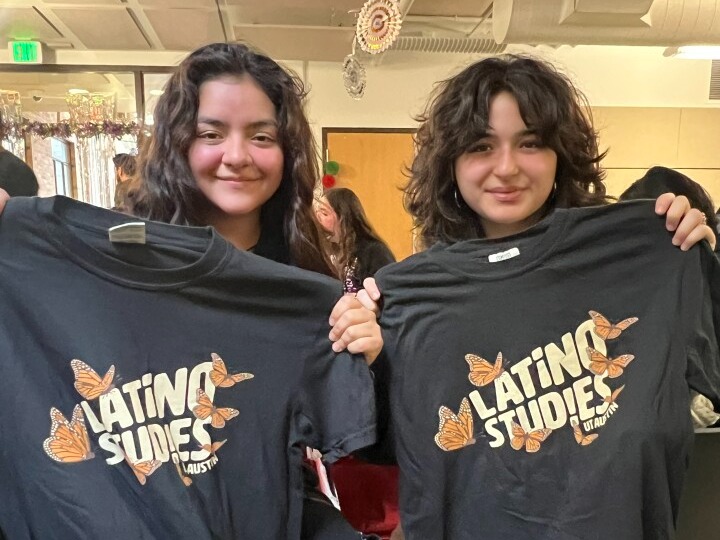
This caption describes the image above.
Three Units. One Mission.
Latino Studies is a powerhouse of Latino thought and advocacy at The University of Texas at Austin, fearlessly upholding the mission of ethnic studies by creating space to explore and understand the lives of Latinos in the U.S. while using our knowledge and resources to support Latino communities everywhere. Since 1970, we’ve grown from a student initiative calling for courses on Mexican American topics to a substantial organization of recognized stature encompassing three program units. Together as Latino Studies, all three units are fiercely committed to the empowerment of students, scholars, and communities for the purpose of realizing our full potential.
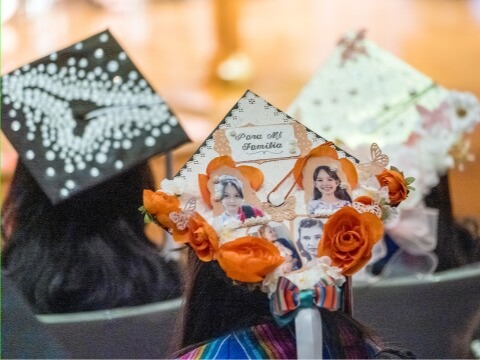
Photo Credit.
Department of Mexican American and Latina/o Studies (MALS)
MALS offers a full spectrum of interdisciplinary courses that challenge traditional narratives through emboldened scholarship.
MALS Website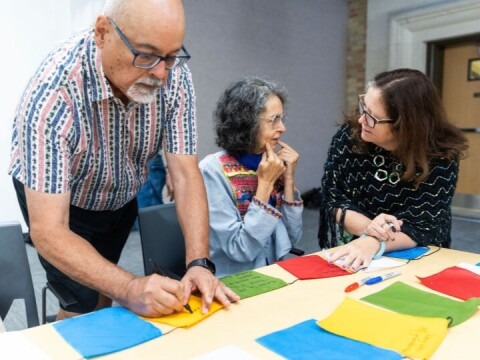
Photo Credit.
Center for Mexican American Studies (CMAS)
CMAS builds on its legacy of collective action by connecting our students to the Austin community through outreach and public events.
CMAS Website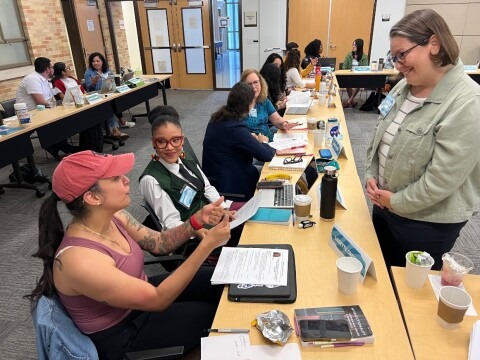
Photo Credit.
Latino Research Institute (LRI)
LRI generates knowledge through research and supports the cultivation of future leaders through its educational programs.
LRI Website
Photo Credit.

Photo Credit.

Photo Credit.

Photo Credit.

Photo Credit.

Photo Credit.
Latino Studies Community Mural
The mural was commissioned in 2024-2025 to commemorate the 10th Anniversary of the Department of Mexican American and Latina/o Studies (MALS). Embodying the theme "Knowledge is Power," the expansive artwork was designed with input from all three units of Latino Studies and installed with the help of UT students in January 2025. Check it out in person, located inside Gordon-White Building Suite 2.102 during regular school hours or visit the page below for more information and a virtual tour!
Learn More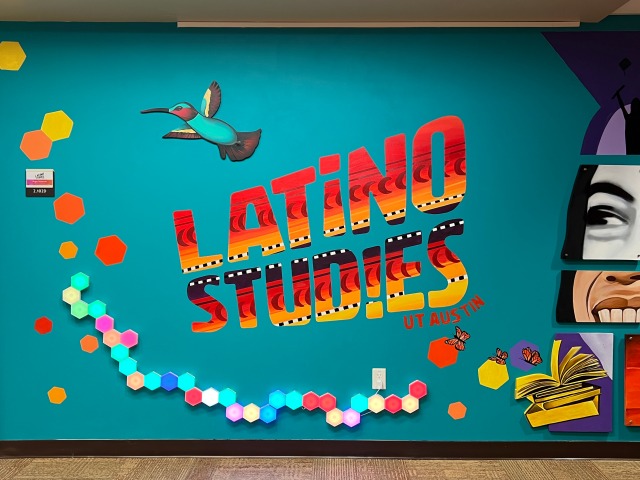
Photo Credit.
La Tiendita
La Tiendita student pantry has been addressing food insecurity among our students since 2016. Latino Studies' confidential, free, donation-based pantry offers non-perishable food items, toiletries, household cleaning products, and more. Our student pantry is stocked by generous donors like Central Texas Food Bank.
La Tiendita is accessible around the clock with a student ID in the main hall of the Gordon-White Building, home of Latino Studies.

Photo Credit.
Semillas
Semillas, Latino Studies’ student-led organization,
plays a key role in building a close-knit campus-wide community. If you’ve taken any MAS class, you’re eligible to join! Come join a community of peers and flex your leadership skills through social and volunteer activities.
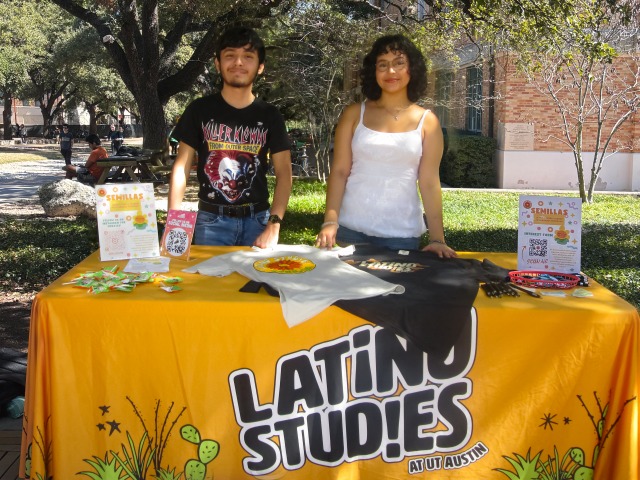
Photo Credit.
LatinXperts Podcast
LatinXperts is the official podcast of Latino Studies at the University of Texas at Austin. LatinXperts features the voices of faculty, staff, and students, as well as friends and alumni of the Department of Mexican American and Latina/Latino Studies, the Latino Research Institute, and the Center for Mexican American Studies.
Learn more about the podcasting process!
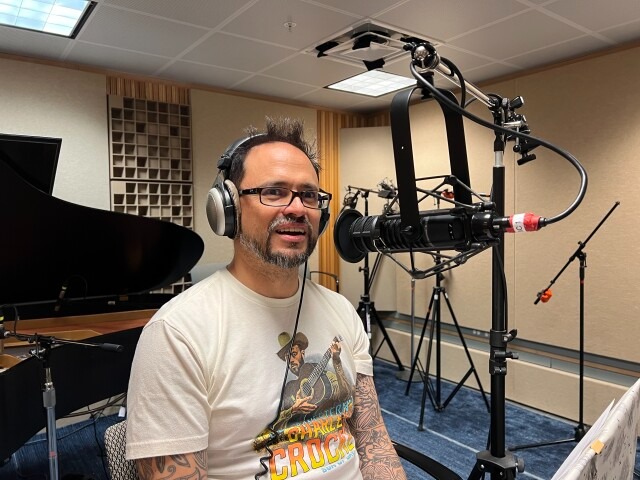
Photo Credit.
Latino Studies
